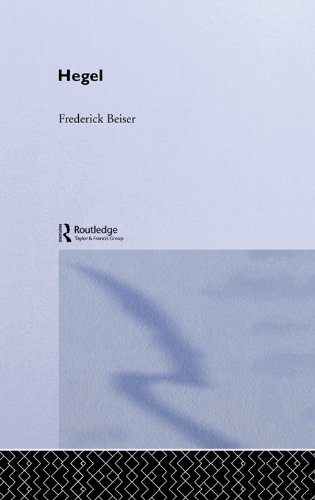In either case, why am I spending good money reading them? I console myself that The Economist does a good quarterly Technology Review and The Times occasionally has some useful news in it.
---
While Clare is at Mass I resume Frederick Beiser's Hegel.
When you read highly abstract discussions relating to substance, essence, the necessary, the contingent, the noumenon and phenomenon, the synthetic a priori, it's tempting to think that the underlying problem set these guys are wrestling with is impossibly abstruse.
Not so: at the end of the eighteenth century, with enlightenment rationality crumbling under the Reign of Terror and religion on the ropes, Hegel and the Romantics are struggling with straightforward questions.
- Is the universe a Newtonian machine or is there scope for free will?
- If knowledge is just representations in our minds, can reality be truly known?
- If we have free will, and God is not a personal judge, whence morality?
Quick example: you concretely see a human walking from one location to another where they start doing certain things in a structured way and conversing with others. What extra information about that scenario's history of embedding relations do you need to properly and fully understand what is happening?
If I tell you the person is a priest and he walked to his church? If I say she is a barista and she walked to her coffee shop in a now-desanctified church? How much more do you need to understand completely and fully? A lot.
You get the idea.
---
In our irreligious age, residual belief in God seems a mere foible. But Hegel was not an atheist, and to be consistent God had to be present in the ontology of reality. Looming over everything was Spinoza's immanent God, a divine presence infusing everything. But this leads to quietist, passive conclusions. If we are part of God, what scope for novelty or freedom?
Hegel adds conflict, dynamics and process through the dialectic, but does he really have a solution?
---
 |
| In the afternoon we strolled to Wookey and had toasted teacakes on our return. |
The evening progresses, I watch BBC coverage of the IAAF World Championships and my distaste with the deep feminisation of media culture surfaces again. Some Brit has just been disqualified in a walking race of epic length after three warnings, at the 10 km mark or thereabouts.
He seems tearful but full of resolve to do better in future. The BBC interviewer is like a trauma therapist: "How do you feel?" "Can you recover from this?" "You put in so much hard work!" ..
Call me systemising rather than empathising but - insofar as I care - I would rather have liked some footage of his DQ faults, and someone explaining technically what he had done wrong and what he should do about it.
Dispassionate analysis? Not what this is about.
OK. I'm done with being vexed for today .. until the BBC News at ten o'clock.

No comments:
Post a Comment
Comments are moderated. Keep it polite and no gratuitous links to your business website - we're not a billboard here.